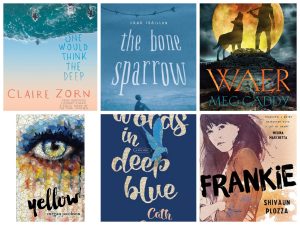I had started reading and already chosen 3 books I wanted to include in my list when the Notables list was announced earlier in the year. When I compared the Notables to the pile of 2016 books I had prioritised for my reading, I was surprised to see a big disjunct: a lot of the books I really was interested in, or had actually already read and loved, weren’t Notables. The regularly list less than 20 Older Readers Notables, which I find a bit frustrating, so I made a conscious decision to focus my reading on non-Notables.
My shortlist ended up looking like this:
Randa Abdel-Fattah‘s When Michael Met Mina
Cath Crowley‘s Words in Deep Blue*
Kirsty Eagar‘s Summer Skin
Justine Larbalestier‘s My Sister Rosa
Glenda Millard‘s The Stars at Oktober Bend*
James Roy and Noël Zihabamwe’s One Thousand Hills
The two books marked with asterix were the only Notables on my list and I was absolutely confident both would be shortlisted, but only Cath Crowley’s exquisite Words in Deep Blue was. (And it’s my pick for Book of the Year.)
None of this is to say that I think there’s any problem with any of the books chosen for the Notables list—on the contrary, it’s a good, solid list, just too short, in my view. I wanted to draw people’s attention to other worthy books, though, and I am very happy with my list. I also noted how the state literary prizes often pick very different books from the CBCA, which is good, really—shares the love, and the prize money, around.
I also added 4 other titles I wanted the audience to know about, and I feel terrible, becauseI left one of them on the kitchen table and so forgot to mention it. My “Notables” were:
Helen Chebatte‘s Bro
Steven Herrick‘s One Night in Mullet Town
Mark Smith‘s The Road to Winter
Lili Wilkinson‘s The Boundless Sublime
I also quoted from a recent article on lithub.com about how YA fiction will change the world, and talked about how some of the best YA fiction manages the delicate balance of addressing current ‘issues’ (how I hate that loaded term) of interest to young people while telling good stories with great characters and beautiful language, and how great YA can help young adult readers consider and make sense of the world they are growing up into. I don’t think we need to shy away from the fact that children and teens learn all kinds of things about the world from literature, that it has a clear socialisation function, and that those things are most effective when the writing is glorious and the storytelling strong.
And if you haven’t seen them, the actual shortlists are here. Can we just take a moment to note what a massive turn-around there’s been from the many, many years when male authors dominated this category; all this year’s shortlisted YA authors are women.
Congratulations to all those listed, commiserations to those feeling miserable that they’re not, and let’s keep reading and sharing great books.







